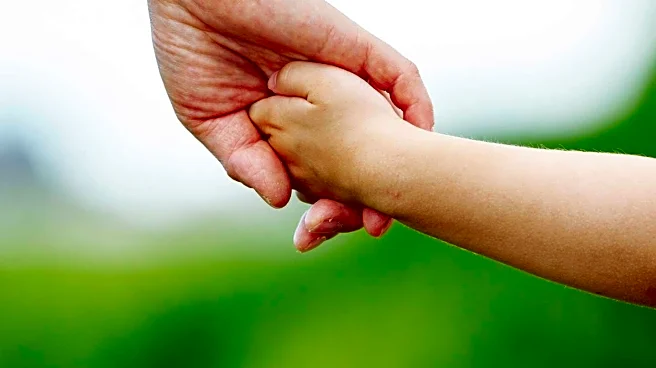What's Happening?
A recent article discusses the persistent gender disparities in caregiving roles within families, particularly when children fall ill. The narrative centers around a mother who finds herself primarily responsible for caring for her sick child, while her husband remains largely uninvolved. This situation is not unique, as studies indicate that 74% of mothers, compared to 40% of fathers, stay home to care for sick children. Experts like Julie Spears, a licensed clinical social worker, and Supatra Tovar, a clinical psychologist, attribute this imbalance to societal expectations and ingrained gender roles. Historically, women have been expected to be the primary caregivers, a role reinforced by socialization from a young age. This dynamic often leads to mothers shouldering the majority of caregiving responsibilities, even when both parents have similar access to resources like paid sick leave.
Why It's Important?
The issue of unequal caregiving responsibilities has significant implications for gender equality and family dynamics. It highlights the societal pressures and expectations placed on women to prioritize caregiving over their careers, often at the expense of their professional advancement and personal well-being. This imbalance can lead to increased stress and potential mental health issues for mothers, who may feel overwhelmed by the dual expectations of being both a primary caregiver and a professional. Addressing these disparities is crucial for promoting gender equality and ensuring that both parents can share caregiving responsibilities more equitably. Encouraging open communication and collaboration between partners can help shift these traditional roles and create a more balanced approach to parenting.
What's Next?
To address these disparities, experts suggest that families engage in proactive discussions about caregiving responsibilities before children fall ill. Establishing clear expectations and dividing tasks can help ensure a more equitable distribution of caregiving duties. Additionally, societal changes are needed to empower fathers to take on more caregiving roles without fear of stigma or professional repercussions. This includes advocating for workplace policies that support parental leave for both mothers and fathers and challenging traditional gender norms that dictate caregiving roles. By fostering an environment where both parents feel equally responsible and capable of caring for their children, families can work towards a more balanced and supportive dynamic.
Beyond the Headlines
The persistence of traditional gender roles in caregiving reflects broader societal issues related to gender equality. These roles are often reinforced by cultural norms and expectations that dictate what is considered appropriate behavior for men and women. Challenging these norms requires a concerted effort from individuals, families, and institutions to promote gender equality and support diverse family structures. This includes recognizing the value of caregiving work and ensuring that both men and women have the opportunity to participate fully in both their professional and personal lives. By addressing these underlying issues, society can move towards a more equitable and inclusive future.











